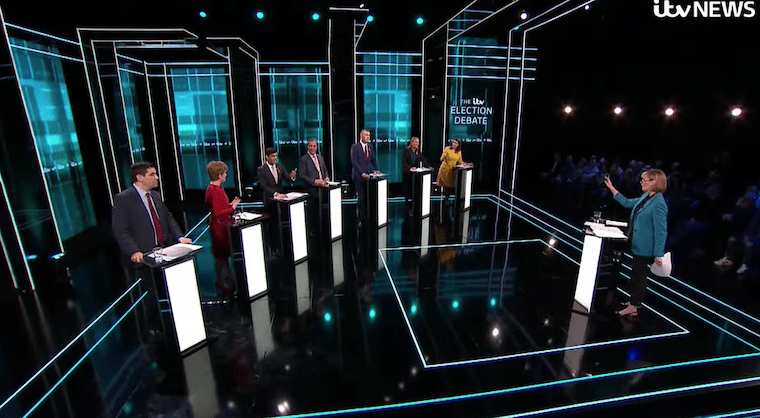Tonight’s ITV election debate had a slightly different cast to the seven-way BBC programme on Friday night, but its spokespeople offered pretty much the same soundbites throughout the show.
It started with the parties arguing about the lessons from the London Bridge attack, with Conservative Rishi Sunak and Labour’s Richard Burgon repeating the lines their leaders have used over the weekend: Sunak had a slightly softer way of putting the Prime Minister’s argument that only a Conservative government can provide the necessary security for voters. But he did say it was important that the leader of a country responded to attacks like this, and emphasised what he claimed was Boris Johnson’s longstanding support for tougher sentencing. Burgon told the studio audience that ‘we can’t do security on the cheap’ and pointed to cuts to the police, prisons and probation service. They were goaded by Nicola Sturgeon, who accused them of politicising the attack, and Nigel Farage, who tried to widen the issue out from just the 74 terrorists released early to returning jihadis as well.
The full debate felt rather more like the local hustings that candidates all over the country are having to attend. Once you’ve attended one of these in a constituency, you can pretty safely predict how all the others will go, from the answers each candidate gives, to the make-up of the audience (largely people who decided how they’d be voting a decade ago). We even heard some of the same answers, repeatedly robotically by some members of the panel. Rishi Sunak was still reciting from memory the slogans he’d been told he absolutely must get in when it came to Brexit – ‘get Brexit done’ and ‘all this dither means more delay, more division and more deadlock’ – while Burgon had the same answer as his colleague Rebecca Long-Bailey to the question of how he’d personally campaign in the second referendum that his leader plans to remain neutral in. He told Julie Etchingham that he would wait to see what the deal was before talking to his local party. It’s a reasonable answer and a good way of avoiding highlighting the divisions in the shadow cabinet over the matter, but it would have greater effect if figures like John McDonnell and Emily Thornberry hadn’t already made clear that they would be campaigning for Remain, no matter what.
There were few stand-out moments from this debate, save Richard Burgon, who tends to offer quite good comedy value if not persuasive clarity of messaging for Labour being left speechless by Adam Price. The Plaid Cymru leader turned on the Labour shadow minister and asked why all the things he was promising weren’t ‘possible in Wales where you’re the party of government?’
There was also a line from Farage which particularly enraged the female party leaders present. As they discussed what sort of relationship Johnson should have with Donald Trump, the Brexit party leader was forced to respond to some of the comments the US president has made about women, including the recording where he is heard joking about how he can ‘grab them by the pussy’. Instead of distancing himself from this, Farage chose to defend Trump, arguing that it wasn’t any worse than what a lot of people say after a night out, before turning on Jo Swinson as she objected, telling her ‘I’m sure you’ve lived the purest life of everybody’.
It was a glimpse of the sort of raw campaigning Farage did in 2015 when he was Ukip leader, rather than the rather smoother pitch that the Brexit party has tried to make. But he is comfortable with his relationship with Trump, whereas the Tories are aware that there are certain aspects which the Labour party can exploit, particularly the fear that the NHS is on the table in trade talks. They are particularly nervous about this week’s Nato summit for that reason: no-one knows what Trump is going to say until the words have left his mouth or he has pressed ‘send’ on a tweet. Sunak tried to turn the conversation around to Corbyn’s strange foreign policy allegiances, and brought up the Labour leader’s response to the Salisbury attack. But Burgon was ready for this, responding that the Tories had their own questions to answer about ‘Russian oligarchs’.
The dynamic of these debates is unquestionably changed when the main party leaders don’t show up. Their substitutes are obviously keen to make a name for themselves, but they are also largely on the defensive, trying to avoid causing any problems for their bosses. We are now entering the last full week of campaigning, and both parties are having to decide how to deal with the slight narrowing of the polls that we saw at the end of last week. Their clear aim tonight was not to move the dial at all – but we did see how the arguments over Trump and terror are going to look over the coming days.







Comments